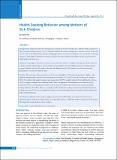Please use this identifier to cite or link to this item:
https://hdl.handle.net/20.500.14356/1746| Title: | Health Seeking Behavior among Mothers of Sick Children |
| Authors: | Shrestha, P D |
| Citation: | ShresthaP. D. (2015). Health Seeking Behavior among Mothers of Sick Children. Journal of Nepal Health Research Council. https://doi.org/10.33314/jnhrc.v0i0.633 |
| Issue Date: | 2015 |
| Publisher: | Nepal Health Research Council |
| Article Type: | Original Article |
| Keywords: | Health seeking behaviour Sick children |
| Series/Report no.: | May-Aug, 2015;633 |
| Abstract: | Abstract Background: Infant and under-five mortality rate in Nepal are 46 and 54 deaths per 1,000 live births, respectively. These mortality indicates, one in every 22 Nepalese children dies before reaching age 1, and one in every 19 does not survive to his or her fifth birthday. Delay in seeking appropriate care and not seeking any care contributes to the large number of child deaths. Existing interventions could prevent many deaths among children if they are presented at health facility and timely care. Methods: A descriptive research was carried out in Lele VDC, ward no.7, Lalitpur. The objective of this study was to find out health seeking behavior among mothers of sick children. Non probability, purposive sampling method was used. Sample size was 102 mothers who had sick children from 0 to 59 months. A set of semi structured questionnaire was used to obtain the data. Results: The mean age of the respondent was 25.8 years and child was 29 months. Respondents’ children who suffered with pneumonia, diarrhoea and malnutrition were 64(62.7%),29(28%), 9(8.8%) respectively. Majority 84(81.4%) mothers had sought treatment and among them 58(69%) sought treatment from health facility whereas 26(31%) sought treatment from traditional healer. There was significant relationship between education of the mother(p=0.05), sex of the child (p=0.004), type of sickness of children (p=0.001) of the mother and health seeking behaviour of mothers. However occupation of the mothers for seeking treatment (p=0.66) and treatment seeking at first (p=0.82) were not significant. So there was no relationship between occupation of the mothers and health seeking behaviour. Conclusions: Majority of the mothers sought treatment from health facility, yet around one fourth went at traditional healers. Education of the mother, sex of the child, sickness of child and mother’s awareness are the factors affecting health seeking behavior of the mothers.  Keywords: Health seeking behaviour; sick children. |
| Description: | Original Article |
| URI: | http://103.69.126.140:8080/handle/20.500.14356/1746 |
| ISSN: | Print ISSN: 1727-5482; Online ISSN: 1999-6217 |
| Appears in Collections: | Vol. 13 No. 2 Issue 30 May - August 2015 |
Files in This Item:
| File | Description | Size | Format | |
|---|---|---|---|---|
| 633-Article Text-1169-1-10-20151231.pdf | Fulltext Download | 228.78 kB | Adobe PDF |  View/Open |
Items in DSpace are protected by copyright, with all rights reserved, unless otherwise indicated.
